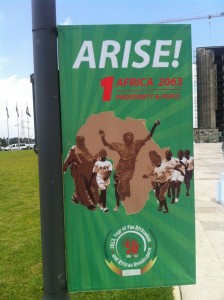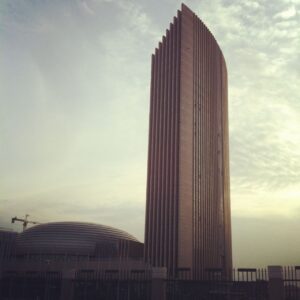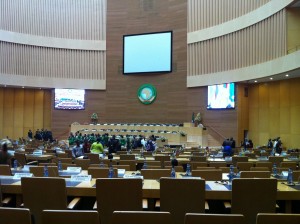The United States of Africa was a concept that was first championed by Jamaican political activist Marcus Garvey in the early 1920s. Decades later, the concept became the late Muammar Gaddafi’s brainchild. It was an ambitious idea but behind closed doors, ridiculed. However, at the time of its conceptualization, it was the most advanced form of regional integration and laid the groundwork for the Organization of African Unity (OAU) and now African Union (AU).
The Summit That Trumped All Summits
From May 24-27 all of Africa’s who’s who and has beens were in Addis Ababa, Ethiopia to commemorate the golden jubilee of the OAU and AU. This “jamboree,” as a former OAU Assistant Secretary General (ASG) labeled it, was a summit that trumped all summits. The importance of such a convening was demonstrated by the presence of President Dilma Roussef of Brazil as well as United States Secretary of State John Kerry, who was arriving on the heels of the recently announced Africa trip by President Barack Obama.

At the AU headquarters, there were many posters with a headline of ‘Africa Rising’ to signify that 2013 is the year Africa takes ownership of its future. “Our time is now,” a Tanzanian diplomat told me when I asked her about the current mood during the summit. “We have a real opportunity to cease the moment and transform our countries for the better.” This optimism was felt throughout the summit but there was a real clash between the symbolism of ‘Africa Rising’ and the realities. The juxtaposition between ‘Africa Rising’ and AU headquarters, a gift by the Chinese, felt like a rising Africa but not really on our terms.
Show Me The Money
One aspect that directly affects the relevancy and sustainability of the AU is the issue of funding. Between 2007 and 2012, the percentage contribution of member states to the programme budget of the AU and its organs went from 27% down to 4.8%. During the same period, external funding rose from 73% to 95.2%. This overreliance on external funding is an existential threat to the AU.
At the summit former President of Nigeria Mr. Olusegun Obasanjo, as Chairperson of a commissioned High-Level Panel on Alternative Sources for Funding of the AU, presented a comprehensive report during a closed session that would directly address this issue. Some of the recommendations of the report include a $2 hospitality levy per tourist stay in hotels and a $10 travel levy on flight tickets originating from Africa and going to destinations outside; or coming to Africa from outside Africa. The expected revenues are $650 million per year via the tax on air tickets and $113 million a year from the levy on hotel accommodations. This would enable the AU to generate total revenues of $763 million per year. Of course this all sounds great in theory, but like everything else it is the implementation of these recommendations that will be a challenge. A delegate that was in the session expressed frustration with how some of the island countries responded to the suggestions by Obasanjo’s report; “we were talking around in circles.” Sadly one can say the same for many discussions at the AU.

Just A Talk Shop
One of the most common criticisms of the AU is that it is just a venue for Presidents to get together to hear themselves talk. Former EAC Secretary-General Juma V. Mwapachu, when I asked him about the AU in the context of comparing it to the African Development Bank (AfDB) said, “the AU is really the definer of Africa’s political and economic development vision. [But] the AU does not have resources to invest and I think therein lies its primary challenge-it increasingly risks being seen primarily as a talk shop.”
I had an interesting exchange with a former OAU ASG who said, “one of the things you have to know about the AU is that people talk a lot. There is a big hiatus between public positions of principles and assertions of sovereignty, dignity and their ability to deliver. So you talk a lot but do very little.” I pressed on this and asked whether things got done during the OAU period? The ASG responded, “yes, I believe things were much better back then and we had our differences but things got done. Right now we just have a jamboree.”
Which brings us back to the AfDB. Fairly or unfairly, these two institutions are constantly compared to see which of the two does more for Africa. It was hard not to take note of the close overlap between the key meetings of each institution. The OAU/AU was celebrating its jubilee, while the AfDB was having its annual meeting, only a few days apart. By Sunday morning, it was clear all the heavy hitters who were at the AU meeting were either on their way or already in Marrakesh, Morocco where the AfDB meeting was being held.
An African Voice

The primary difference between the OAU and AU is that the OAU’s sole purpose was to liberate the African countries from colonialism and thereafter unite against apartheid South Africa. As a result, member states of the OAU had a unified African voice. It seemed easier to align over an issue such as anti-Apartheid and colonialism, but that unity and ‘Africaness’ has faded since the establishment of the AU in 2001. I asked a Tanzanian diplomat whether African countries were less united or more united under the AU. She paused, and answered “we are united in the sense that we all want infrastructure development and we all understand the resource issues facing the continent. The problem is implementation.”
It is hard to say, truly, whether the continent is more united but it is quite telling that many of the conflicts that plagued the OAU are still very much alive today, from the Democratic Republic of Congo to Somalia and Ethiopia-Eritrea in the Horn of Africa, as well as the never-ending stalemate in Western Sahara. What hinders the AU is the lack of an African voice to the most pressing challenges facing the continent and beyond. What is the position on climate change and global warming? What is the African position on Syria?
The disunity and contradictions of the AU was seen on high display in Libya during the 2011 conflict. The inability to unite with respect to Libya deepened significant fissures within the institution. “Libya was a fiasco,” former OAU Secretary-General Dr. Salim A. Salim told me. “In Libya, the AU capacity to deal with a crisis of that magnitude was limited. Secondly, the people who were supposed to project an African position let us down,” namely South Africa and Nigeria who voted in favor of UN Security Council Resolution 1973 that approved a no-fly zone over Libya authorizing all necessary measures to protect civilians. The Libya debacle led to blame games within the AU that ultimately led to divisions between the Anglophone and Francophone countries and ouster of Jean Ping, former Chairperson of the Commission.
African Solutions to African Problems
The Libya case was just another example of how having ‘African Solutions to African Problems’ is a lot easier said than done. Divisions in how to address the most various conflicts will continue to hinder this ideal. If the mood in Addis was one of jubilation, the mood on Twitter and other social media outlets was one of disappointment. A diplomat at the summit expressed this disappointment saying “there is serious lack of humanity on the continent” in discussing the array of troubles still plaguing Africa.
How can the AU transform itself and start solving important African problems? I asked this to Abdullahi Boru, a Horn of Africa specialist, and he said, “the AU needs to move away from being a club of defending its own.” Does this mean the AU has to think big and bold? Mr. Boru answered, “it needs to be ahead of the curve by providing cutting edge solutions to the new problems that were not around half a century ago when the OAU was formed.”
The AU in 50 Years: Relevancy
So, will we care about the AU in 50 years or will future generations learn about it in classrooms as just another attempt to achieve the vaunted United States of Africa? It’s hard to say especially with the rise of regional blocs like the EAC. There seems to be a feeling that an unintended consequence of the rising importance of regional blocs will be at the expense of the AU.
Mr. Boru agrees beilieving that “the regional outfits will make the AU a bit irrelevant.” I asked Dr. Salim whether regional outfits would supplant the AU and he said, “that has always been a debatable point. I have always taken the position that the stronger the regional economic groups the better for the continental organization.”
Clearly if the AU wants to be relevant in 50 years there has to be a level of convergence between itself and the regional economic blocs. The two areas that seem to be in strong agreement across the board is infrastructural development and regional economic integration. “There are a lot of points of convergence,” Dr. Salim told me while we were in Addis, “we are all basically trying to make ourselves relevant and individually you can’t make yourselves relevant.”
I spoke with an Ethiopian development specialist about the AU’s relevance in the future. “I believe the AU is absolutely an important institution for the continent,” he told me in a strong defense of the organization.
He made an interesting point that the AU was similar to intuitions like the UN and European Union, and as a result suffers the same problems but that doesn’t mean we will be better off without it. Maybe we get what we deserve? The specialist told me “if the institution is perceived as being indecisive, ineffective and corrupt, perhaps that’s an accurate reflection of many of our countries and leaders across the continent.” So perhaps, instead of using the AU as a piñata to exert our frustrations, we should pause and realize we are just looking in the mirror.
This piece originally appeared in The East African on June 1, 2013. You can access the piece here


Once upon a time it was easy to defend Rap music/ Hip Hop, the same way it was with defending Africa, today not quite.
I like sometimes we spend too much time worried about how the West views us, rather than actually doing something about the image.
It is similar with the recent whining about the ICC targeting African leaders, really?, is that even something we should be worried about? The question is, those who they are targeting, are the targeting because they actually did something, or are they targeting innocent people.
The ICC can bring a broom or even a vacuum and sweep this continent clean. There is no excuse for Africa being where we at, with all the resources.
Its probably true that the AU is just a talk shop. The last line of this article, cleverly sums up what we need to hear “instead of using the AU as a piñata to exert our frustrations, we should pause and realize we are just looking in the mirror”.
All I’m saying is, we need to stop whining and witch hunting, because we’re failing ourselves. Example, the Chiefs back then signed bogus contracts, they didn’t know how to read and write English/ French/ Portuguese but when leaders of today do the same, what is their excuse?
Bahati thanks for your comments and I agree with a lot of your sentiments. The ICC response after the summit was unfortunate in that the only thing we saw in the headlines was how the AU thinks the ICC is hunting Africans (racist hunt), I think this assertion is a bit much and filled with hyperbole.
The truth is a lot of African leaders have led with impunity and a lot of conflicts have been fought in Africa, nevertheless there needs to be a distinction between countries that actually invite the ICC into their borders and the UN Security Council recommending such a move. Either way, I do believe that we need to look at ourselves in the mirror if we want to find answers to why the AU is the way it is.
Probably regional blocs are a better option, with the war in the Congo which has practically absorbed a big chunk of East African countries.
Am glad Tanzania might be moving towards Independent candidates and ministers wont necessarily be picked from the pool of MPs. Although I’m very skeptical but I know there are a lot of people who are capable of steering the ship to the right direction, but political party politics is what is draining us right now.
The first time I started paying attention to Ayittey I thought he was too critical but now I have realized he made/ makes a lot of sense. Although in his book I didn’t agree with his evaluation of Nyerere’s era, but he’s take on the post colonial government was on point. We need to move on from that era, today is brand new day.
I have always find it interesting how nobody (African countries) intervened during the 1994 genocide. So when Pres. Kikwete made the comments he made the other day about Rwanda and the war in the Congo, I thought, oh thats a bit random, isnt he few years late.
What Africa need is to start being self critical, and STOP being overly sensitive over trivial things. But of course this needs to be done respectful and collectively. We cant be shaking hands with killers, and pretend their bloody hands are not going to stain us.
Nipeni urais, the first thing I will do, I will build a BIIIIIIIIIG Prison. We jail Mapapa and it will provide cheap labour/ our cash cow. We need a bit of Malcolm X mentality in our diet, porridge isn’t cutting it, after all these babies are 40+ years, so am sure they have teeth to chew, so why are we still feeding them cerelac?